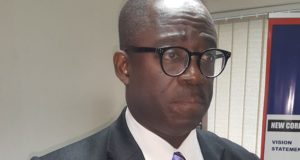The Deputy Minister for Energy, William Owurako Aidoo, has said that the opposition National Democratic Congress (NDC) has no right to comment on the recent power outages and predicaments because they (NDC) presided over a worse power situation.
According to Owurako Aidoo, the NDC cannot continue to comment on the “one week” old power challenges when power challenges persisted for more than three years in their administration.
Speaking on Eyewitness Owuraku Aidoo said;
“Isn’t it ironic that one week of power fluctuation has become news and John [John Jinapor] has the audacity to come and stand on radio and talk to the good people of Ghana about there being one week of power fluctuation when his government presided over more than 3 years of power outages?
He added that the NDC government cannot exonerate itself from the supposed debt in the energy sector.
According to him, the NDC government left a debt of over $2 billion within the sector which the government was gradually paying back.
“It is zilch for John or anybody from the NDC to go out to the power domain to complain about one week of power fluctuation. And that is the difference between us and them. It is all propaganda now coming out with fanciful ideas about debts, of course there are debts in the system. They left us 2.4 billion debt within the power section which we have been working very hard, assiduously to pay off. That is the way to go,” he added.
Contrary, Mr John Jinapor speaking on the same programme said government’s excuses for the power fluctuations are not tenable.
He condemned the Deputy Energy Minister’s comments saying they were irresponsible.
His comment comes at a time when many Ghanaians have complained about rampant power outages some of which lasts several hours.
The situation has seen some civil society organizations criticize the government for poorly handling the situation.
There have been arguments that the situation is due to mismanagement of financial resources by the government leading to huge debts and its inability to pay suppliers.
But the government had in many previous interviews denied that the challenge was financial.
A minority member of the Energy Committee of Parliament, Adams Mutawakilu said the challenges were due to liquidity issues but the government said that was untrue until Monday when it made a U-turn on its stance.
The Energy Minister, John Peter Amewu at a press conference conceded that there were some financial issues that delayed processes to resolve the power challenge.
“Our major challenge has been the incomplete reverse flow project to flow gas from the West to the East. We had to fast-track it through a by-pass which has been completed, but not connected to the West African Gas Pipeline yet. This is because WAGPA has not come out with the tariff for the reverse flow, and WAPCO will not sign the Gas Transportation Agreement (GTA) without a tariff.
WAPCO wants to charge US $3.2 MMBtu, whilst we want to pay US$1 MMBtu.”
“[The new amount] will now be approved by the Committee of Ministers of WAGP on 30th November, 2018, that is, coming Friday, to pave the way for the signing of the GTA, to allow for the connection of the by-pass….This will ensure 60mmscfd can flow from the West to the East until the reverse flow project is completed.”
Mr. Amewu, however, stressed that the challenges of Ghana’s power supply and the power cuts citizens suffered are now under control.
“The Ministry of Energy wants to assure the public that the situation now is very much under control.”
Nonetheless, citizens are becoming agitated about the behaviour and lack clarity in terms of strategy in ending dumsor for good. Ghanaians pay much more comparatively on energy prices.
–
Story modified from original piece on citifmonline



